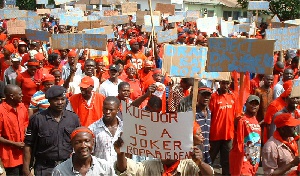- Home - News
- TWI News | TV
- Polls
- Year In Review
- News Archive
- Crime & Punishment
- Politics
- Regional
- Editorial
- Health
- Ghanaians Abroad
- Tabloid
- Africa
- Religion
- Election 2020
- Coronavirus
- News Videos | TV
- Photo Archives
- News Headlines
- Press Release
General News of Wednesday, 22 February 2006
Source: --
Police "Invite" Anti- ROPAB demo leaders
Accra, Feb. 22, GNA - Police on Wednesday invited several leaders of Tuesday's demonstration against the Representation of the People (Amendment) Bill, which turned violent when the protestors clashed with Police.
A police statement named them as Hajia Mariama Sinare, Mr Gariba Baya, Mr Adam Mohammed Sanusi, Mr Alfred Lartey, Mr Bernard Mornah of the People's National Convention (PNC), Mr Johnson Asiedu Nketiah, General Secretary of the National Democratic Congress (NDC), Mr Mahama Ayariga, NDC MP for Bawku Central and Alhaji Iddrisu Bature.
The statement said the Accra Regional Police Command was conducting further investigations to identify others who were involved or responsible for the acts of disorder.
The police said some of the demonstrators refused to obey Police directions, attacked public officers and caused damage to property. Sources close to those arrested said they had been bailed and were to report to the Regional Police Command on Thursday afternoon. They have been charged with conspiracy to commit crime, obstructing traffic and destruction to property. The anti-ROPAB demonstration, the second in one week organised by a group called "Concerned Ghanaians", turned violent at the Castle Junction when their leaders had gone to the Castle to present a petition to the President. The Police Administration on Tuesday condemned various acts of disorder and violence perpetrated by some people, who took part in demonstration. A statement signed by the Director of Police Public Affairs, Deputy Superintendent of Police, Mr David Eklu said: "The Police Administration takes very strong exception to the various acts of lawlessness such as burning of lorry tyres, stone throwing and other acts of violence that resulted in injuries to the Deputy Inspector-General of Police in Charge of Operations and some other Police Officers." The Police statement said the acts of violence forced them to use tear gas and water canons to disperse the crowd. The Police noted that the various acts of violent behaviour by some of the demonstrators "clearly run counter to the assurance the leaders of the demonstrators gave when they met the Inspector-General of Police and other Senior Police Officers at the Police Headquarters on Monday, February 20th 2006".The statement urged all those who intended to embark on any future demonstration to be thoroughly familiar with the requirements for organizing special events under the Public Order Act 1994 and respect any advice from the Police especially with regard to the starting point, routes to be taken and where the event would end." The National Democratic Congress (NDC) on Wednesday criticised the police for its reaction during Tuesday's demonstration against the Representation of the People (Amendment) Bill, which ended in clashes between demonstrators and the police Addressing an emergency press conference in Accra, Mr Johnson Asiedu-Nketia, NDC General-Secretary said they regretted the few acts of indiscretion that took place, but condemned the reaction of the police, which he described as "most unfortunate and unbecoming of a unit charged with keeping the public peace." "One such incident, which was most disgusting was when the police pounced on a protestor who had gone to the rescue of another protestor whose leg had been intentionally run-over by a police vehicle," he said. Police and demonstrators clashed at the Castle Junction after the protestors started pelting the police with stones and the police fired tear gas canisters into the crowd. The NDC scribe described as "most appalling" the attempt by the Regional Police Command to justify their action, which they have referred to as "the use of minimum force to respond to the minor incidents that could not be described as provocative by any stretch of imagination." He explained that the party had cause to believe that there was a premeditated attempt on the part of the government and certain officers to use violence as a means of intimidation to scare away supporters of this and future demonstrations.











